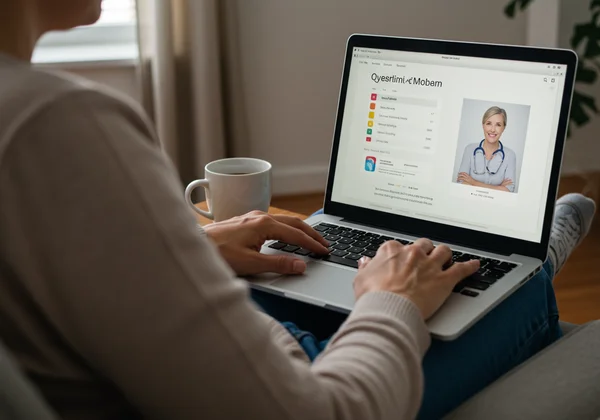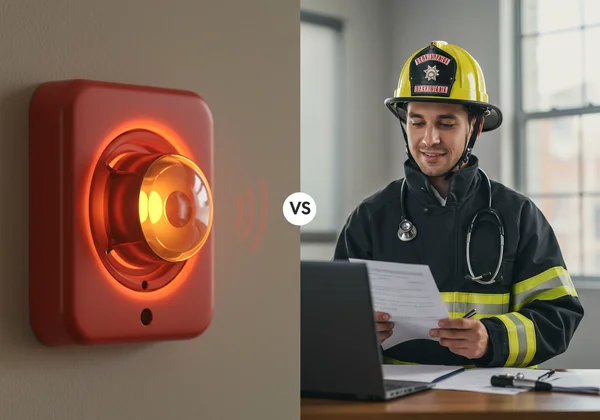Are Online Autism Spectrum Tests Accurate? Screening vs. Diagnosis
September 7, 2025 | By Leo Whitaker
Introduction: Are You Wondering About Online Autism Tests?
If you're exploring the possibility that you or a loved one might be on the autism spectrum, you've likely come across various online tests. The internet offers a convenient and private space to seek answers and understanding. But this accessibility brings up a crucial question: Is an online autism test accurate? This is a valid and important concern for anyone starting this journey, whether you're a parent observing your child's development or an adult reflecting on your own life experiences.
This guide will provide a clear and compassionate explanation of what an online autism spectrum test can and cannot do. We will explore the vital difference between a screening tool and a formal diagnosis, helping you set realistic expectations and take informed next steps. Understanding this distinction is the key to using these online resources effectively as part of a larger path toward clarity. For a reliable starting point, you can take our free test for confidential, science-based insights.
Understanding Online Autism Screening: A First Step
An online test is best understood as a preliminary screening tool. Think of it as the first chapter in a story, not the entire book. Its purpose is to help you identify and organize observations about certain traits and behaviors that may be associated with Autism Spectrum Disorder (ASD). This initial step can be incredibly empowering, providing structure to feelings or concerns that may have been vague before.
A well-designed online autism screening can help you gather valuable information. It can highlight areas of potential strength and challenge, turning abstract worries into concrete points for reflection or discussion. This process is not about labeling but about illuminating, offering a private and pressure-free way to explore neurodiversity.

What is an Online Autism Spectrum Test and How Does it Work?
At its core, an online autism spectrum test is a questionnaire. It presents a series of questions about social communication, sensory experiences, patterns of behavior, and interests. These are not random queries; a reputable test uses validated questions drawn from clinically recognized screening instruments developed through years of psychological research.
You or a loved loved one will be asked to reflect on these questions and answer honestly based on your observations. The system then scores your responses against established benchmarks to provide an initial result. This result indicates whether you show a low, moderate, or high number of traits associated with autism. It’s a data-driven starting point for deeper self-awareness.
The Benefits of Initial Online Autism Screening
Taking that first step can feel daunting, which is where the benefits of online screening truly shine. The most significant advantage is immediate, private access. You can take the test from the comfort of your home, at any time that works for you, without the need for an appointment or referral. This removes common barriers like cost and waiting lists that often delay the process of seeking professional help.
Furthermore, an online screening can provide valuable preliminary insights. For many adults, it can validate lifelong feelings of being different. For parents, it can help articulate specific concerns to bring to a pediatrician or specialist. By using a confidential autism test, you can organize your thoughts and prepare for more formal conversations.
Autism Screening vs. Formal Diagnosis: Knowing the Difference
This is the most critical concept to grasp: screening is not diagnosis. While they are related, they serve fundamentally different purposes in the journey of understanding autism. Confusing the two can lead to misunderstanding and anxiety. A screening tool flags potential characteristics, while a diagnosis provides a definitive clinical conclusion.
The distinction between autism screening vs diagnosis is like the difference between a smoke alarm and a firefighter. The alarm (the online test) is an excellent tool for alerting you to a potential issue. However, only a firefighter (a qualified professional) can assess the situation, determine the cause, and confirm if there is a fire.

What Constitutes a Formal Autism Diagnosis?
A formal autism diagnosis is a comprehensive and multi-faceted process conducted by a team of qualified professionals, such as a clinical psychologist, psychiatrist, or developmental pediatrician. It involves much more than a single questionnaire. A clinical assessment typically includes:
- In-depth interviews: Discussing developmental history, family background, and current challenges.
- Direct observation: Professionals observe social interaction and communication skills in a structured setting.
- Standardized diagnostic tools: Using gold-standard instruments like the ADOS-2 (Autism Diagnostic Observation Schedule).
- Input from others: Gathering information from parents, teachers, or partners to get a holistic view.
This thorough process is necessary to rule out other conditions that may present with similar traits and to provide a definitive diagnostic conclusion.
Why Online Tests Are a Screening Tool, Not a Diagnostic One
An online test cannot replicate the depth and nuance of a formal evaluation. It lacks the human element of direct observation and cannot interpret the subtleties of an individual's life experiences. A screening tool is a snapshot, whereas a diagnosis is a complete portrait created through expert analysis.
The results from an online screening should always be followed by a professional evaluation if you have significant concerns. The online tool is a powerful guide for whether to seek that evaluation, but it can never replace it. A responsible online platform will always make this limitation clear to its users, empowering them with knowledge while respecting the boundaries of its role.
What Makes an Online Autism Test Reliable?
With countless options available, how do you identify a reliable autism test? Not all online screenings are created equal. A trustworthy tool will be built on a foundation of scientific rigor, transparency, and respect for the user. It should be a resource that empowers you, not one that offers false certainty or misinformation.
Look for platforms that are open about their methodology and prioritize user privacy. The goal is to find a tool that provides meaningful insights while clearly stating its purpose as a preliminary step. A reliable online test can be an invaluable ally in your journey toward understanding.

The Importance of Scientific Basis and Validated Questions (e.g., AQ, M-CHAT)
The single most important factor for reliability is the scientific foundation of the test. Trustworthy screening tools are based on established and peer-reviewed research questionnaires. For example, many adult autism tests adapt questions from the Autism-Spectrum Quotient (AQ) test, developed by Simon Baron-Cohen and his colleagues at Cambridge University.
Similarly, screenings for young children often rely on instruments like the M-CHAT-R/F™ (Modified Checklist for Autism in Toddlers, Revised, with Follow-Up). Using an AQ test or M-CHAT-based screener means the questions have been tested for their ability to identify autistic traits. Our platform is proud to base its questionnaires on these proven scientific instruments.
Transparency, Data Privacy, and User-Friendly Design
Beyond the science, reliability is built on trust. A good platform will be transparent about what it does and how it handles your data. Look for a clear privacy policy that explains how your information is protected. The experience should be confidential and secure, allowing you to focus on your self-assessment without worry.
The design should also be user-friendly and accessible. The language should be clear, respectful, and free of jargon. A reliable tool is designed to support you, providing results that are easy to understand and accompanied by guidance on what to do next. This commitment to the user experience is a hallmark of a trustworthy resource.
Your Next Steps After an Online Autism Screening
Navigating the world of online autism tests can be confusing, but understanding their true purpose is empowering. An online screening is an excellent, accessible, and often free first step to explore autistic traits for yourself or a loved one. It provides valuable insights that can validate your feelings and help you organize your thoughts for a conversation with a professional.
However, it is crucial to remember that a screening is not a diagnosis. For a definitive answer, you must consult with a qualified clinician. A reliable online test serves as a bridge, guiding you from initial curiosity to informed action. It is a tool for illumination, not a final verdict.
If you are ready to take that first step, we invite you to start your screening on our platform. Our tests are confidential, science-based, and designed for all ages, offering a summary of your results and an optional AI-powered report for deeper, actionable insights.
Frequently Asked Questions About Online Autism Tests
Is an online autism test accurate enough for a diagnosis?
No. While a high-quality online test can accurately screen for autistic traits based on validated questionnaires, it is not a substitute for a formal diagnosis. A diagnosis can only be given by a qualified healthcare professional after a comprehensive clinical assessment. Think of an online test as a reliable first step to guide your decision-making.
What is the most accurate autism test available professionally?
There isn't one single "most accurate" test, as a formal diagnosis relies on a combination of tools. However, the Autism Diagnostic Observation Schedule, Second Edition (ADOS-2) is widely considered a "gold standard" observational assessment used by clinicians to evaluate communication, social interaction, and imaginative use of materials.
What should I do after a positive autism screening test result?
A result indicating a high number of autistic traits should be seen as a prompt to gather more information. We recommend discussing the results with a trusted healthcare provider, such as a general practitioner or pediatrician. They can provide a referral to a specialist for a formal diagnostic evaluation. Our online autism screening can provide a helpful summary to share.
How do I get a formal autism diagnosis?
The process typically starts with your primary care physician, who can refer you to a specialist like a psychologist, psychiatrist, or developmental pediatrician. The specialist will then conduct a comprehensive evaluation that includes interviews, observation, and standardized testing to determine if you or your child meet the criteria for Autism Spectrum Disorder.
Can an online autism test tell me if I am mildly autistic?
An online screening test can indicate whether you have a low, moderate, or high number of traits associated with autism. While this may align with concepts like "mild autism" or what was previously known as Asperger's Syndrome, these are not formal diagnostic terms anymore. A screening tool can provide directional insight, but only a professional can determine your specific support needs and provide a nuanced diagnosis.